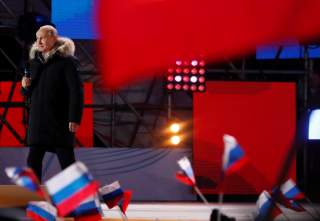The West Should Avoid Starting a New Cold War with Russia
The divisions and geopolitical landscape are far more complex than during the Cold War.
Such comparisons obviously are imperfect, but only in nuclear weapons does Moscow have relative military parity. It possesses one aircraft carrier, sort of, versus ten American carrier groups. The Russian air force and air defense system are competent, and would force the Pentagon to plan a war without absolute air superiority, for once, but they likely would not prevail. The Putin government has rebuilt the army after its less than stellar performance in Georgia, but there is no adjoining American territory for Moscow to invade. And Russia lacks air or naval lift to reach the United States, and would regret arriving if it could.
Which leaves Europe. However, the continent enjoys almost twelve times Russia’s economic strength—Italy alone (as well as Germany, the United Kingdom and France) has a larger GDP than Russia. The Europeans already spend upwards of five times as much on the military as Moscow; collectively the United Kingdom, France, and Germany, despite their anemic efforts, devote almost two and a half times as much as Russia to the military.
True, the Europeans suffer problems of interoperability, coordination, and deployment. Nevertheless, the idea that Moscow could successfully attack America and Europe is a fantasy. While the allies should prepare for any eventuality, the primary responsibility should fall on Europe, which both is relatively more vulnerable and entirely capable of defending itself.
How to pull U.S.-Russia relations out of their tailspin? Federal, state, and local officials should defend the one vital interest at stake, the integrity of American democracy. Of course, Washington would have greater credibility in doing so if it acknowledged having interfered in scores of democratic elections worldwide, including in Russia. U.S. policymakers should stop meddling to help America’s foreign friends, improve electoral safeguards at home, and prepare to retaliate in response to future interference by Russia or anyone else.
Washington should end the diplomatic tit-for-tats. Communication channels need to remain open. The more people—businessmen, tourists, students, family members, athletes, performers and others—who visit each way, the better. This would be one way to demonstrate that this is not Cold War II.
The United States also should address Moscow’s security concerns. American policymakers express shock and sadness that anyone anywhere fears the United States, but any nation on Washington’s naughty list should worry about covert or overt efforts at regime change. The United States and Europeans should explore a settlement with Russia involving Georgia and Ukraine which includes the end to NATO expansion. In return, the Putin government would stop supporting anti-Kiev rebels. Moscow isn’t going to return Crimea, which historically was part of Russia: the United States and Europe should de facto accept the annexation, dropping sanctions if Moscow stops undermining Ukraine’s territorial integrity.
On other issues—Syria, Iran, North Korea and more—the two sides should return to old-fashioned compromise. Russian interests are legitimate and need to be taken into account. Along the way Washington should look for ways to loosen the China-Russia partnership. The PRC poses a far greater long-term challenge to America. A friendlier Moscow, like India, could act as an important counterweight to Beijing.
The state of the U.S.-Russia relationship is bad, but it is not Cold War II. Washington should ensure that relations do not further deteriorate. The Russian Federation is too important a country to treat as an enemy. No one would gain from a new conflict, whether cold or hot.
Doug Bandow is a Senior Fellow at the Cato Institute and a former Special Assistant to President Ronald Reagan. He is author of Foreign Follies: America’s New Global Empire.
Image: Russian President and Presidential candidate Vladimir Putin delivers a speech during a rally and concert marking the fourth anniversary of Russia's annexation of the Crimea region, at Manezhnaya Square in central Moscow, Russia March 18, 2018. REUTERS/Maxim Shemetov

